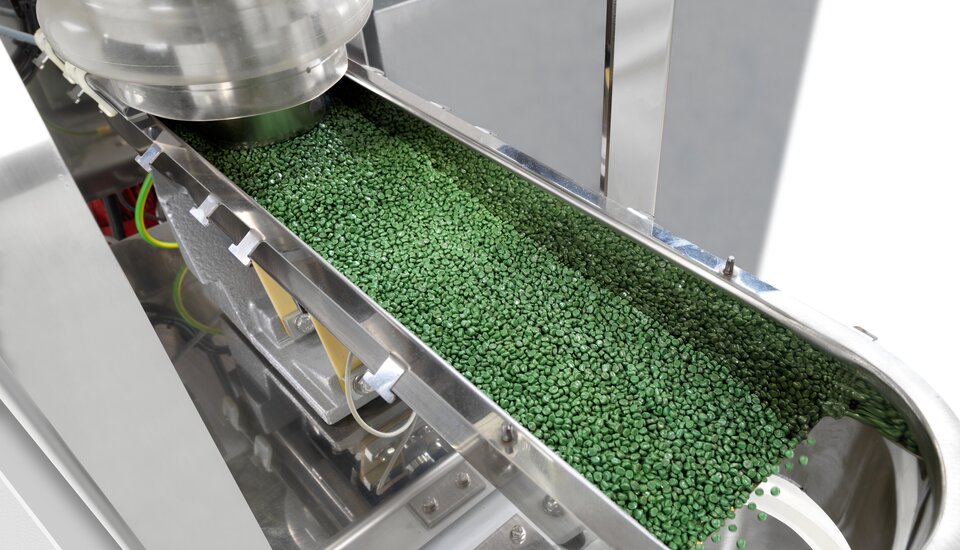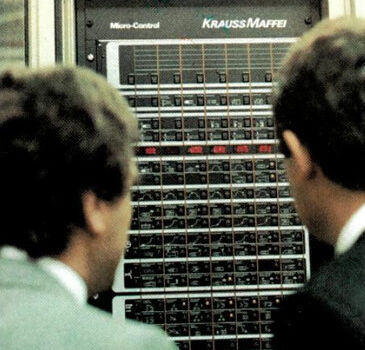
Trendgineering
"Versatile LSR makes a splash in medical technology"
| Petra Rehmet
Even extremely low wall thicknesses safely under control with APC plus
Ventilator masks, slotted membranes for vaccines or filter membranes in the dialysis area – they all are made of a high-tech material that, due to its properties, is more suitable for medical applications than virtually any other – liquid silicone rubber (LSR). Processing it requires a lot of expertise. Stefan Fenske, Director Global Application Owner Non-Automotive, and Markus Lunz, Head of Service Portfolio Development, explain in our interview how it is done.
Ahead
Everyone knows silicone from articles such as baby pacifiers, but what makes the material so extraordinary and suitable for the medical sector?
Stefan Fenske
One example is the fact that it is biocompatible, yet antibacterial. It is robust and heat-resistant, that is, it can be sterilized, and it does not lose its flexibility. Despite all this, it does not contain any plasticizers. You also can achieve extremely low wall thicknesses with it, which makes it ideal for applications such as membranes.
Ahead
Can every injection molding company process LSR?
Markus Lunz
Yes – with our help, anyway. You have to pay attention to a few things. For example, the molds must be extremely tightly sealed because of the low viscosity of LSR, and the temperature control in the process is exactly the opposite of what it is for thermoplastics. In this respect, it is advisable to have an experienced partner when you take your first steps in using the technology.
Ahead
What does KraussMaffei have in store when silicone becomes part of the game? And can you explain this based on an application example?
Stefan Fenske
For example, there is our all-electric PX SilcoSet with integrated automation and dataXplorer. You can see the advantages of our system very well in articles such as our filter membrane for the dialysis area. It is produced in a 32-cavity mold and has a component weight of only 0.03 g. This means that the requirements regarding precision in the production process, shot weight accuracy and traceability are very stringent.

Maximum precision:
the PX SilcoSet ensures perfect charging of cavities
Ahead
How do you ensure that the tiny articles are perfectly charged?
Markus Lunz
Here, we achieve very good values with the PX even in its standard version. When we synchronize this with APC plus, our Adaptive Process Control system, we are able to reduce scrap to an absolute minimum. To do so, the viscosity of the material is recorded for each shot, and the process is adjusted to the current conditions in real time. This is how we achieve perfect product quality.
Ahead
And how do you demold components that are both small and flexible?

Intricate:
The micro-membrane (0.03 g)
Stefan Fenske
Due to the structure of the filter membranes with their holes, demolding by vacuum suction unit is not an option. Our solution is gripping the components by their edges, although the edge of a membrane is only 0.2 mm wide and there must be no mold contact during demolding. As if this were not enough of a challenge, it is also necessary to demold 32 membranes at the same time – the whole thing is a job for experts.
Markus Lunz
This is also what makes APC plus, our adaptive process control system, so critical. It ensures that the cavities are always charged perfectly. Otherwise, the gripper would miss the components. In that case, the components would have to be demolded manually every now and then. Meanwhile, the mold would cool, and the viscosity of the material would change. Without the automatic adaptation of the process by APC plus, automation of this process sequence would be quite impossible.
Ahead
You previously mentioned dataXplorer. What is that?
Stefan Fenske
dataXplorer is another tool for supporting this process in the long run. It continuously records up to 1000 signals per injection cycle and saves them. If you visualize this continuous data as a graph, this allows you to obtain far deeper insight into the process than if you only operate with the current cyclical default values. Each cycle is saved in a separate file – which makes it possible to precisely trace every part produced. Moreover, dataXplorer allows you to identify process-specific problems and instabilities, which in turn forms the basis for more advanced analyses and optimization. Because of this, we lovingly call the dataXplorer the black box of the injection molding machine.
Ahead
So KraussMaffei provides everything that is necessary for silicone processing?
Markus Lunz
Exactly. If you have a challenging project with LSR or want to start using the technology, we will be happy to offer our expertise and help you out.


contact
Stefan.Fenske@kraussamffei.com

















